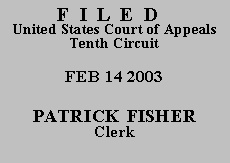

| UNITED STATES OF AMERICA,
Plaintiff - Appellee,
v.
JAMES L. GIBSON Defendant - Appellant. |
No. 02-6108
(D.C. No. CR-99-177-A
& CIV-01-1431-A |
Mr. Gibson entered a plea of guilty to aiding and abetting the unlawful possession of a firearm by a convicted felon. See 18 U.S.C. § 2(a), § 922(g)(1). His plea included a waiver of his rights to appeal or to collaterally challenge his plea, conviction or sentence.(1) Mr. Gibson now contends that his guilty plea was not knowing, voluntary, or intelligent because he was misinformed about its sentencing consequences and because he received ineffective assistance of counsel during the plea process. He argues further that the waiver of appeal rights in the plea agreement is invalid due to the alleged involuntariness of his plea. The district court examined these claims and found them to be without merit.
As the district court correctly noted, in United States v. Cockerham, 237 F.3d 1179 (10th Cir. 2001), cert. denied, 534 U.S. 1085 (2002), we explained the significance and effect of waiver provisions where ineffective assistance claims are involved. A waiver such as the one made by Mr. Gibson is generally enforceable. An exception exists where the defendant claims ineffective assistance of counsel in the negotiation of his plea agreement or with respect to the waiver itself. Id. at 1190-91. Mr. Gibson challenges the voluntariness and intelligence of his plea and waiver of rights with what he claims was deficient advice from his attorney concerning the potential sentence he might receive.
In assessing this claim, the district court catalogued the occasions on which Mr. Gibson was informed by the court and his attorney of the terms and potential ramifications of his plea, his waiver, and the potential sentencing consequences. It further noted Mr. Gibson's acknowledgment that he accepted the terms of the plea agreement and waiver and understood their impact. The court also listed the occasions on which Mr. Gibson's counsel demonstrated his competent representation of his client in the plea negotiation process. Having thoroughly reviewed the record, we agree with the district court's conclusion that there is no merit in Mr. Gibson's claim of ineffective assistance of counsel in the plea negotiation process.
Insofar as Mr. Gibson's claims on appeal constitute attacks on his sentence or on his representation in the sentencing process, we affirm the district court's holding that these attacks cannot survive the waiver in the plea agreement which was voluntarily and knowingly made. See Cockerham, 237 F.3d at 1186-87.
In short, because none of Mr. Gibson's challenges survive the waiver agreement in his plea, he cannot show that reasonable jurists could debate whether the petition should have been resolved differently or that the issues presented are adequate to deserve encouragement to proceed further. See Slack, 529 U.S. at 484. He has thus not made a substantial showing of the denial of a constitutional right to warrant an issuance of a COA. See 28 U.S.C. § 2253(c)(2). Accordingly, we DENY the application for a COA and DISMISS the appeal.
ENTERED FOR THE COURT
Stephanie K. Seymour
Circuit Judge
*.This order and judgment is not binding precedent, except under the doctrines of law of the case, res judicata, and collateral estoppel. The court generally disfavors the citation of orders and judgments; nevertheless, an order and judgment may be cited under the terms and conditions of 10th Cir. R. 36.3.
1. The waiver in this case stated:
Defendant understands that a sentencing guideline range for his case will be determined by the Court under the guidelines issued by the U.S. Sentencing Commission. Defendant also understands that the Court has jurisdiction and authority to impose any sentence within the statutory maximum for the offense(s) to which he is pleading guilty. Defendant further understands that Title 18, United States Code, Section 3742, gives him the right to appeal the judgment and sentence imposed by the Court. Acknowledging all this, defendant in exchange for the promises and concessions made by the United States in this plea agreement, knowingly and voluntarily waives his right to appeal or collaterally challenge:
a. Defendant's guilty plea and any other aspect of his conviction, including but not limited to any rulings on pretrial suppression motions or any other pretrial dispositions of motions and issues.
b. Defendant's sentence as imposed by the Court and the manner in which the sentence is determined, provided the sentence is within or below the applicable guideline range determined by the Court to apply to this case, even if the Court rejects one or more of the positions of the United States or the defendant set forth in paragraph 6 concerning the application of the U.S. Sentencing Guidelines; provided that (i) defendant specifically does not waive the right to appeal an upward departure from the sentencing guideline range determined by the Court to apply to this case, and (ii) his waiver of rights to appeal and to bring collateral challenges shall not apply to appeals or challenges based on changes in the law reflected in Tenth Circuit or Supreme Court cases decided after the date of this agreement which are held by the Tenth Circuit or Supreme Court to have retroactive effect.
Rec. vol. I, doc. 76 at 4-5.